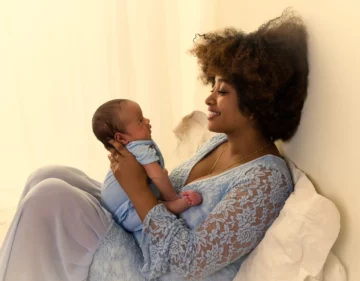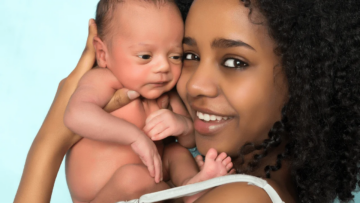

- What is bonding?
- What if I don’t bond right away?
- What are some ways to bond with my baby?
- Is it unusual to have a hard time bonding with my baby?
- When should I be concerned?
What is bonding?
When experts talk about bonding, they’re referring to the intense attachment you develop with your baby. It’s the feeling that makes you want to shower him with love and affection, or throw yourself in front of a speeding truck to protect him.
For some parents, this takes place within the first few days – or even minutes – of birth. For others, it takes a little longer. In the past, researchers who studied the process thought it was crucial to spend a lot of time with your newborn during his first few days to establish a bond right away.
But now we know that bonding can take place over time. Parents who are separated from their babies soon after delivery for medical reasons, or who adopt their kids later in childhood also develop close, loving relationships.
What if I don’t bond right away?
Don’t worry. Bonding often takes time. As long as you take care of your baby’s basic needs and cuddle her regularly, she won’t suffer if you don’t feel a strong bond at first sight.
“There’s so much discussion about bonding with a new baby that mothers often feel guilty if they don’t feel some incredible attachment to their new baby immediately,” says Edward Christophersen, a pediatric psychologist in Kansas City, Missouri. “But bonding is truly an individual experience, and it’s just as reasonable to expect the bond to develop over a period of time as it is for it to develop instantaneously.”
Go easy on yourself: Being a new parent is exhausting. Many moms feel stressed, overwhelmed, or even unhappy during the first couple of weeks – a period also known as the baby blues. And if you had a difficult delivery, you may need some time to recover before you can concentrate on bonding with your baby.
In some cases, an underlying medical problem can be a factor. Some women experience a drop in thyroid hormones about four to eight months after giving birth. Low thyroid levels can make you feel depressed, easily irritated, and have trouble sleeping or concentrating – not exactly leaving you in the mood to smile and coo with your baby. Let your healthcare provider know if you have any of these symptoms, or if you notice other signs of an underactive thyroid, such as weight gain, constipation, or dry skin.
What are some ways to bond with my baby?
The parent-child bond grows through everyday caregiving. Your baby may be cute and cuddly, but he’s also an entirely new person you have to get to know. There’s no magic formula, but a few things can help the process along.
- Have plenty of skin-to-skin cuddle time. Human touch is soothing for both you and your baby, so hold him often and stroke him gently.
- Breastfeed your baby. Breastfeeding releases hormones in your body that promote relaxation as well as feelings of attachment and love.
- Communicate throughout the day. Look into your baby’s eyes while you talk and sing to him. Narrate what you’re doing, thinking, and feeling.
- Play with him every day.
- Carry your baby in a sling or front carrier. Feeling your baby’s warmth, smelling his sweet scent, and looking down often to make eye contact with him can help you bond.
- Spend plenty of close-up face time with your baby. Smile at him, and return the smile when he smiles first. Before long, you’ll be having a kind of conversation with him – when you smile, he smiles. And when you coo, he’ll coo back.
- Read to him every day. Cuddle up together with a colorful book.
- If your baby has to spend some time in intensive care and is hooked up to wires and monitors, ask the hospital staff to help you touch and hold your baby safely.
Is it unusual to have a hard time bonding with my baby?
No, it’s not unusual to find bonding a challenge. Becoming a parent overnight is a major, overwhelming life change, and it’s natural to feel a lot of complex emotions.
Here’s one of her experience: “I expected to feel a deep, overwhelming love for my baby at first sight. I was surprised when, despite a natural home birth and breastfeeding, I initially felt that she was a stranger. This has changed over time, and now I have immense feelings of love for her and love spending time with her.
I have read and reflected a lot. I think there were a couple of difficulties that affected my emotional state. First, I hemorrhaged after the birth, and I think I was pretty anemic for some time. Second, breastfeeding was excruciating, and since that is all my baby wanted to do the first few weeks, life felt very difficult.
For those who bonded immediately, that’s wonderful! I wish the same for all mothers! For mothers who have not bonded as easily, I say hang in there. Be gentle and patient with yourself and your baby. I am sure these feelings come in time.”
When should I be concerned?
Many new parents start to feel closer to their baby over time. If, after a couple of weeks, you find that you don’t feel more attached to your baby than you did the first day, tell your baby’s doctor and let your own healthcare provider know.
Some new mothers have trouble bonding with their baby because they’re struggling with postpartum depression (PPD). This is a common condition that occurs in at least 10 percent of births and can lead to serious problems if left untreated. Call your provider if you experience five or more of the following symptoms almost every day, for most of the day, for at least two straight weeks:
- Extreme sadness, emptiness, or hopelessness
- Constant crying
- Loss of interest or lack of enjoyment in your usual activities and hobbies
- Trouble falling sleep at night, or trouble staying awake during the day
- Loss of appetite or eating too much
- Unintentional weight gain or loss
- Overwhelming feelings of worthlessness or overpowering guilt
- Restlessness or sluggishness
- Difficulty concentrating or making decisions
- Feeling that life isn’t worth living
Other possible signs of PPD include being irritable or angry, lacking interest in your baby, avoiding your friends and family, constantly doubting your ability to care for your baby, and worrying excessively about your baby.
If you’re worried that you might have PPD, there’s no need to feel embarrassed or ashamed about seeking help and treatment – it’s the best move you can make for both you and your baby. If your provider thinks you may have PPD, she’ll refer you to a therapist or psychiatrist for treatment, which could include medication.
Read more about





